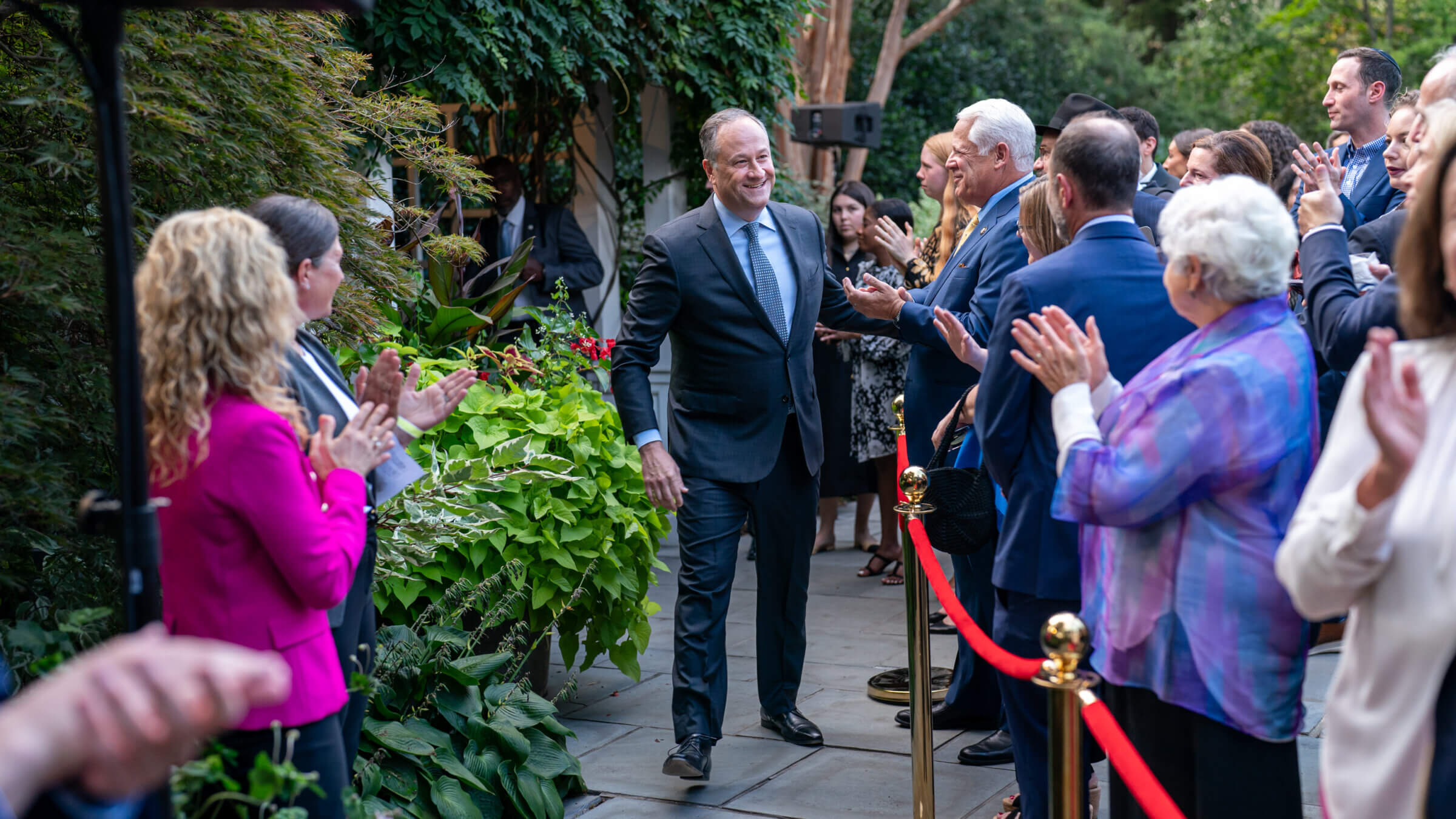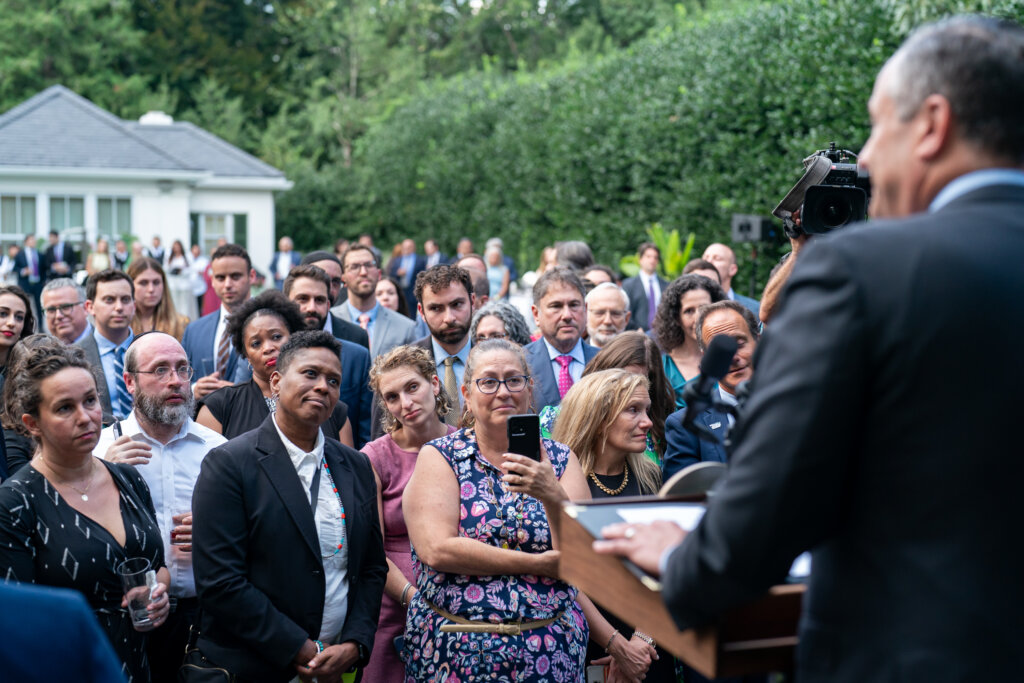At the vice president’s house, a hot and muggy celebration of Jewish pride
Vice President Kamala Harris quoted from the Talmud. And for once, Rep. Adam Schiff tried to avoid the spotlight

Second Gentleman Doug Emhoff schmoozed with the crowd for quite some time following a reception for Rosh Hashanah, Tuesday, September 12, 2023, at the Vice President’s Official Residence in Washington, D.C. Photo by White House photographer Lawrence Jackson
WASHINGTON — Vice President Kamala Harris quoted from the Talmud. The Marine Band played klezmer music. Queer rabbis mingled alongside black-hat ones. And for once, Rep. Adam Schiff tried to avoid the spotlight.
On a hot and muggy Tuesday evening, Vice President Harris and Doug Emhoff, the second gentleman, hosted a pre-Rosh Hashanah reception for around 150 Jewish leaders and celebrities at their residence in Washington, D.C., which proudly sports a mezuzah on the front door. It was a lively reminder that, despite our cynicism, we don’t have to let Judaism be defined by those who hate us.
Our sacred task of repairing the world “is a fight for something, not against something,” the Vice President reminded us. “It’s a fight for enlightenment. It’s a fight for justice, fairness and kindness, knowledge.”
Speaking over what sounded like a thousand cicadas, Emhoff gave his usual talking points about combating antisemitism. But he also fondly recalled his recent visit to his Jewish summer camp, where he was awarded “best athlete” decades ago.
I had last seen Emhoff in January, when we touched down, bleary-eyed and happy to be home, at Joint Base Andrews following a whirlwind week in Poland and Germany.
“That trip will always stay with me. I still think about it all the time,” Emhoff told those gathered during his remarks at the residence.

Emhoff had gone abroad to commemorate International Holocaust Remembrance Day and learn from international efforts to combat antisemitism. In May, pulling in part from experiences of that trip, the White House released an ambitious official strategy to do the same.
When we caught up following the event, I told Emhoff that I appreciated his mention of “direct and concrete actions” the administration had taken to combat antisemitism. He quipped that it “has the benefit of being true.”
But it would be unwise to stop your understanding of Emhoff, and American Jews, at the polished veneer and can-do attitude.
So many of those in attendance at Tuesday night’s reception, for all their fancy suits and schmoozing abilities, had escaped and overcome so much. Emhoff’s family escaped the bitter fate of most of Poland’s Jews. Regina Spektor’s family escaped the Soviet Union. Several CEOs and rabbis in attendance clawed their way out of intergenerational trauma and poverty. And then there’s Ruth Cohen, a survivor of Auschwitz, who was both Emhoff’s guest at the State of the Union and an attendee at the evening’s party. She’s never been back to Poland, and shook her head at the thought of going back.
“This coming year,” Emhoff told those gathered, “I’m committed to doing even more, pushing back even more, building more coalitions and bringing more people together in this fight with us, in this fight that affects all of us.”
It wasn’t like he wanted to. But when you are the country’s first Jew to be a member of the second family, you don’t really have a choice.
“This issue really found me,” Emhoff said at the reception. “And I had to step up for all of us.”
But Tuesday night was a party, not a time for thinking about the Holocaust.
The Marine Band, in crisp red dress uniform, solemnly played a mix of klezmer music and soulful Jewish melodies, an experience which I can only describe as odd. Regina Spektor, a Hebrew school graduate, performed a rendition of “Avinu Malkeinu” she finished arranging on the Acela, along with several of her own songs (which comedian Alex Edelman, watching with rapt attention, enthusiastically mouthed along to).
“It just made me so happy” to see people openly and unabashedly showing their Jewishness, she said of the journey to D.C., remarking with wonder at seeing a businessman in a kippah studying Torah on the Acela train.
The evening was pretty tame, as far as D.C. parties go. There was never a line at the bar, which offered several Herzog wines and a pomegranate cocktail, and most attendees seemed keen to take photos with celebrities or catch up with those whom they already knew — and avoid falling into the pool, which took up the bulk of the event space.

The hors d’oeuvres, curated by Adeena Sussman, included lamb skewers, fluffy falafel pockets, tahini blondies and airy apple cake. In addition to conducting a whirlwind tour for her latest cookbook, Shabbat, Sussman has been protesting for Israel’s democracy every week from her home in Tel Aviv, sometimes feeding fellow demonstrators before and after.
She told Dave Cavell, the Harris speechwriter who had written Harris’ earlier d’var Torah, that the protest movement could use a unifying voice like him.
Several members of Congress slunk in after dark, and the second gentleman schmoozed with guests until a strong rain ended the evening a little after 8 p.m. We were ushered away from the residence and given a parting gift of shot-glass-sized jars of honey.
After the event, I went for drinks and dinner with about a dozen of the folks under 40 who had come to D.C. for the reception. It was a much more diverse crowd than the event itself on pretty much every metric.
None of us had any immediate takeaways, beyond being happy to have been there — and to now eat more than a mouthful of passed appetizer at a time. If you had probed, you would have discovered deep ideological differences. But for at least one evening in D.C., we could come together in the oldest Jewish tradition: They tried to kill us. We survived. Let’s eat.
“We are seeing these surges of hate,” the vice president said at the event. “But when we look closer, we know that the vast majority of the people understand that we all have so much more in common than what separates us.“
Correction: An earlier version of this article misstated the name of the song that Regina Spektor arranged and performed. It was “Avinu Malkeinu,” not “Shalom Aleichem.”
A message from our Publisher & CEO Rachel Fishman Feddersen

I hope you appreciated this article. Before you go, I’d like to ask you to please support the Forward’s award-winning, nonprofit journalism so that we can be prepared for whatever news 2025 brings.
At a time when other newsrooms are closing or cutting back, the Forward has removed its paywall and invested additional resources to report on the ground from Israel and around the U.S. on the impact of the war, rising antisemitism and polarized discourse.
Readers like you make it all possible. Support our work by becoming a Forward Member and connect with our journalism and your community.
— Rachel Fishman Feddersen, Publisher and CEO






























